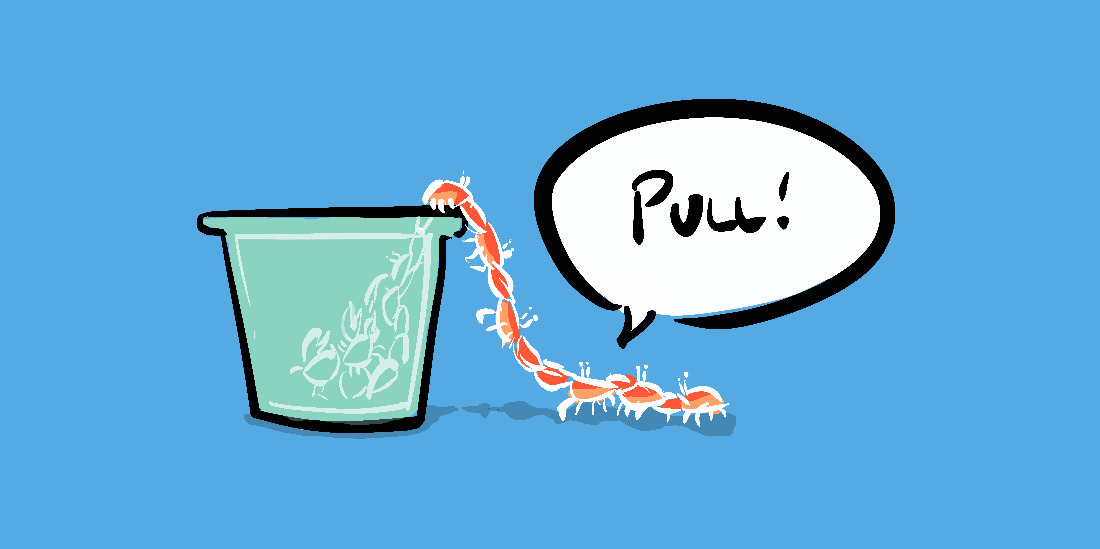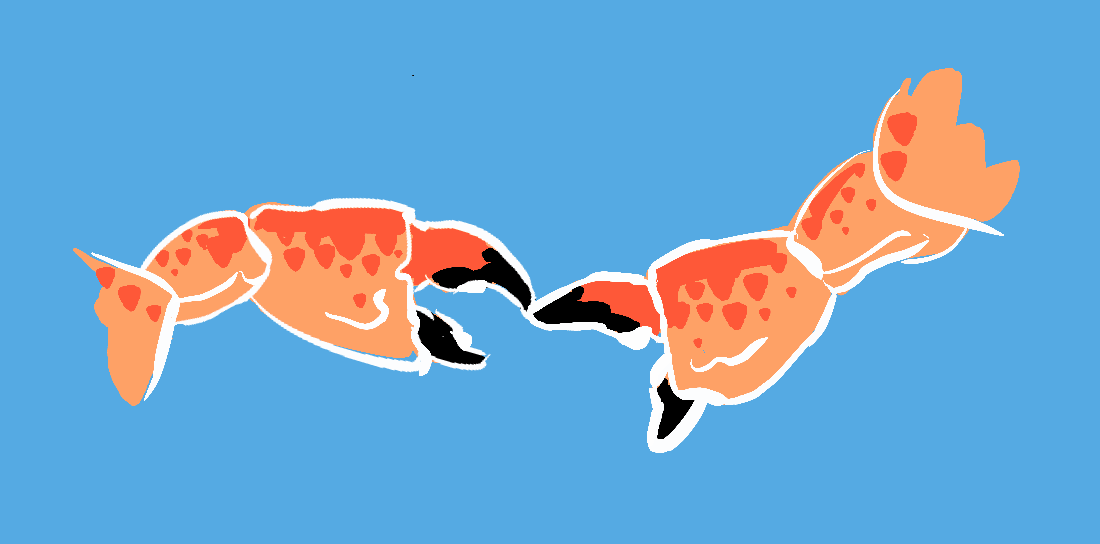According to some highly authoratitive anecdotal accounts, when a lone crab is placed in a bucket it will crawl out of its own accord but put a pile of crabs in a bucket and they will pull each other down in an attempt to escape, dooming them all. This is a classic illustration of a negative-sum game, and these games, as the name implies, are just the worst.
There are two ways of looking at this illustration • • •
Similar to Tall Poppy Syndrome whereby people are pulling others down to their level, purely out of spite or to make themselves feel better relative to others.
A Moloch-y system whereby the narrow individual imperative to escape results in an incentive to use others to climb out, which results in no one escaping.
A counterpoint to this illustration could be a situation where crabs (which are quite capable of holding on to each other) could form a ladder, and then a sort ofrolling chain to enable the escape of everyone.

Sometimes we are told that acting in our own narrow self-interest is natural or even good. Crabs in a bucket illustrates that in many situations narrow self-interest is counter-productive and that thinking about our own position relative to others can leave everyone worse off.
AN EXAMPLE FROM HISTORY
As a child I was horrified by the Hillsborough Disaster^ where overcrowding at an FA Cup semi-final resulted in a massive human crush as panicked Liverpool supporters tried to escape. I remember my dad trying to explain to me how almost 100 people could be crushed and killed by accident (the breakdown of systems and the ills of groupthink are subjects for another time).
Adding to the tragedy, over the succeeding years, the public saw another example of crabs in a bucket as authorities, media and management attempted to evade responsibility by each blaming the other and the victims.
WHAT ABOUT YOU?
No doubt you’ve found yourself in situations where someone has pulled you down to get ahead? Perhaps you’ve fallen prey to zero-sum thinking yourself, assuming it’s you or them? Sometimes it might seem like we’re all crabs in a bucket.
But how often does the opposite happen? Where humans support each other to achieve win-win scenarios? How often do fellow employees turn up to work regularly, drivers stop at red lights, customers provide free word-of-mouth advertising for businesses, not to mention all the support families provide for each another?
Let us know in the comments below of your own experiences being trapped in a bucket or escaping one!

While the concept of crabs in a bucket can help us to anticipate the negative outcomes of zero-sum thinking, it’s important to remember—we are not crabs!Through recognising that others don’t operate selfishly most of the time, we can exercise greater trust in one another and climb out of them buckets together.
RELATED CONTENT
For more about reframing our understanding of human naturecheck out Rutger Bregman’s Humankind^.

Fwiw this review discusses why Rutger Bregman’s book is deeply flawed.
”That he felt the need to misrepresent the past and other cultures in order to provide a ‘hopeful’ history is rather a message of despair. Bregman presents hunter-gatherer societies as being inherently peaceful, antiwar, equal, and feminist likely because these are commonly expressed social values among educated people in his own society today. This is not history but mythology.”
Thanks for your comment.
Bregman doesn’t make this assertion in Humankind, but rather makes a well-supported case that systems of control and incentives play to our worst instincts. Bregman provides vast supporting evidence for his claims, and over-turned many of my fundamental assumptions about the nature of humanity—which I had simply gleaned from popular psychology and “common sense”, through the weight of the evidence he provides.
I recommend both his recent books highly. While he may be pushing a particular narrative, it is one that is a counterweight to the prevailing distorted narrative of humanity passed down by the likes of Golding, Milgram and Zimbardo.
It’s odd that you say the reviewer provides no support for his assertions. It seems to me like the reviewer presents quite a bit of evidence.
For example, in responding to Bregman’s claim that male control over female sexuality (and gender inequality more generally) began with the rise of agriculture, Buckner (the reviewer) mentions arranged marriages among the !Kung, a hunter-gatherer society. Buckner also references husbands beating their wives for infidelity among the Kaska, a nomadic foraging society. He also references the Ache, a hunter-gatherer society, whose elite men “monopolized many fertile women in the population.” He also references the Mi’kmaq foragers, whose elite men get priority over the women and children for prime food.
In response to Bregman’s claim that sedentism and property ownership are responsible for the origins of warfare, Buckner cites a paper by Wrangham and Glowacki who summarize the literature: “cases of hunter-gatherers living with different societies of hunter-gatherers as neighbors show that the threat of violence was never far away.”
In response to Bregman’s claim that hunter-gatherers didn’t take ownership over inventions or tunes, Buckner contradicts this by referencing the Yolngu and Northwest Coast fisher-forager societies who do just that.
I don’t think anyone who actually read the review could honestly say, “The reviewer provides no support for his assertions.”
Hi Nathan,
I’m really sorry, I didn’t actually mean to include that sentence! After making the claim, based on the quote alone, I read the article and indeed the author provides plenty of supporting evidence for his claims. I had thought I’d deleted the sentence before sending.
I’ve edited that sentence out now. Sorry for wasting your time having to make the case against it.
I only meant to make the claim that Bregman doesn’t make the claim as plainly as the reviewer makes out, and that Bregman does a good job of providing his own evidence—detailing how much inherited wisdom today comes from flawed research.